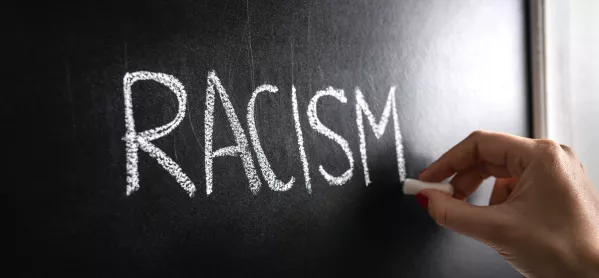Complaints about racist incidents in Scottish schools are often not taken seriously enough, according to young people who contributed to a report published today.
More than half of the survey respondents disagreed or strongly disagreed with the statement “teachers at my school were knowledgeable about the processes they were required to follow if a racist incident happened at school”.
One young person said: “I got no compassion, the teacher just said, ‘What do you want me to do about it?’”
Tes Scotland podcast: ‘Use the school curriculum to tackle racism’
BAME teachers: Teaching body CEO ‘sickened’ by racism in schools
Racism: Are we ‘sliding away from confronting the issue’?
The findings emerge in a report published by Intercultural Youth Scotland, In Sight, on how young BAME (black and minority ethnic) people perceive and experience secondary school education.
Tackling racism in schools
Around half of respondents expressed disagreement or strong disagreement with the statement “I believe my school would respond effectively to any concerns raised about racism or discrimination”.
One young person said: “I feel as if my school doesn’t really do any more after a first complaint on racism and discrimination.”
Another said that, at school, they were “treated it as if I was in the wrong rather than the person in question [being wrong], and I never received an apology”.
There were also accusations of teachers procrastinating over how to respond and some teachers being “so much in denial about racism”.
One young person said: “The person who makes the racist remarks is treated with too much compassion and it is quickly dusted under the rug.”
Around half of respondents in the survey of 110 BAME young people disagreed or strongly disagreed with the statement “subjects taught at school reflected my life experiences as a BAME person in Scotland”.
An “overwhelming proportion” disagreed that “in English lessons our class read books about experiences that related to my culture, heritage and background”.
One respondent said: “The majority of teachers in my school aren’t racist. But you can acknowledge that some of them are, even when I am one of the top students in class. I will be treated differently compared to white, noisy pupils that lack effort. It was also obvious how I was treated differently because of my colour and religion by my [teacher].”
While eight out of 10 male respondents agreed or strongly agreed that “my school promoted a welcoming and diverse culture”, fewer than half of female respondents did. Female respondents also had more negative responses to several other questions - around three-quarters, for example, agreed or strongly agreed with the statement “other pupils at my school did not understand my culture, heritage or background”.
Intercultural Youth Scotland co-chair and spokesperson Lana Abbas said that very few people in schools “truly understand our challenges of racism and inequality, they don’t know how it feels to be hated”.
She added: “We recognise the best efforts of some teachers when dealing with bullying but the work isn’t consistent. We have evidence of schools following procedures correctly, but this is not the same in every school.
“Racism cannot and must not be treated the same as a bullying incident.”
Meanwhile, refugee children are to be informed of their educational rights through new packs issued by Scotland’s largest teaching union, the EIS.
EIS president Bill Ramsay said: “The EIS is proud to launch these new packs, which will be given to young people who arrive in Scotland as refugees or migrants to help welcome them to their new school communities.
“We hope that these packs can, in a small but meaningful way, help to ease the often challenging transition to a new country for these young people.”
The welcome packs also contain stationery and books gifted by the EIS and sister education union the American Federation of Teachers.




